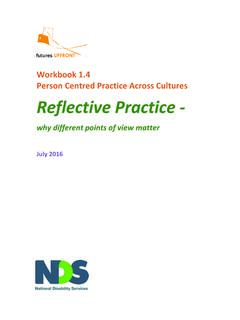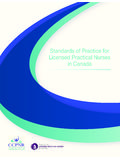Transcription of Reflective Practice Model for ... - NISCC Learning Zone
1 Stan HoustonSchool of Sociology, Social Policy and Social WorkQueen s University BelfastFULL VERSIONR eflectivePracticeA Model for Supervision and Practice in Social by:Northern Ireland Social Care Council7th Floor, Millennium House19-25 Great Victoria StreetBELFASTBT2 7 AQTel: 028 9536 2600 Website: : Published May 2015 NISCC copyright 2015 The text of this document (this excludes, where present, the Royal Arms and all departmental or agency logos) may be reproduced free of charge in any format or medium provided that it is reproduced accurately and not in a misleading context. The material must be acknowledged as NISCC copyright and the document title specified.
2 Where third party materials have been identified, permission from the respective copyright holder must be sought. ISBN 978-0-9557755-8-1 Reflective Practice : A Model for Supervision and Practice in Social WorkAcknowledgementsThe author would like to thank the following people: members of the *steering group and, in particular, Mrs Marian O Rourke and Ms Evelyn Magee; and all the staff who participated so fully in the *Steering GroupReflective Practice : A Model for Supervision and Practice in Social WorkStan Houston is a Professor of Social Theory and Social Work in the School of Sociology, Social Policy and Social Work, Queen s University Belfast.
3 His professional background lies in child and family social work where he practised in various roles for nearly 20 years. His academic interests focus on the application of critical social theory and philosophy to social work Practice . He is also interested in developing social work Practice through action the AuthorAlison Shaw NISCC Barbara Gillen NHSCTB renda Horgan NISCCC ampbell Killick SEHSCTC aroline McGonigle NHSCTC hristine McLaughlin WHSCTE velyn Magee NIDSWPG eraldine Patterson SHSCTG illian McAuley ExternJoanne Sansome NISCC Participation PartnershipLouise Ormsby YJAM axine Devenney Education Welfare BoardsMarian O Rourke NISCCMary McColgan UUPaul Thompson PBNITheo Raykoske BHSCTS tephen Knox BarnardosIntroductionThe Domain of PsychobiographyThe Domain of RelationshipThe Domain of CultureThe Domain of OrganisationThe Domain
4 Of Politics/EconomyInterlinking ConceptsEnabling Others through Practice : A Model for Supervision and Practice in Social WorkI am pleased to introduce the Model for Reflective Practice and Supervision in Social Work. Reflective Practice is one of the core tenets of the professional social work role. It is important that social workers are able to show how, when and where reflection is used to inform and improve Practice . Having in place a Model that has been developed with the support of social work students, practitioners, managers, supervisors and educators across Northern Ireland is a significant step forward for the profession.
5 NISCC promotes the development of quality Practice and supports the view that standards drive up quality. Having a Model that supports best Practice standards for social work across the health and social care, justice, education, voluntary and independent sectors is a welcome development that will have a positive impact on the quality of services delivered to vulnerable people in our identified Reflective Practice as an area that would benefit fromadditional resources, NISCC commissioned Professor Stan Houston from Queen s University Belfast, to develop a Model that could be used at qualifying and post qualifying levels.
6 In Practice and professional supervision in all settings across Northern Ireland to enhance social workers Practice and improve outcomes for service users. In collaboration with Professor Houston, NISCC established a steering group of key partners who contributed to the development of the Model by bringing their extensive range of skills and experience to the process. The development process has also been supported by engagement with a wide range of social workers at key stages in their careers from a cross-section of Practice settings throughout the Practice : A Model for Supervision and Practice in Social WorkThe DHSSPS 10 year strategy for social work, launched in April 2012: Improving and Safeguarding Social Wellbeing, A Strategy for Social Work in Northern Ireland, 2012-2022, was launched in 2012 and sets out a range of strategic priorities that include: adding value/delivering outcomes.
7 Promoting a culture of continuous improvement and a focus on demonstrating the outcomes and Learning from Practice . This Model for Reflective Practice will directly support and make a valuable contribution to this culture of continuous improvement. We are confident that social workers, their employers and educators will be keen to embed the Model in their culture and use it to underpin good governance of supervision and safe and effective Practice . This Model promotes social work as a profession that is underpinned by standards of Practice as well as requisite knowledge and skills. Use of the Model provides a structure and framework that supports professional development and encourages evidence-based Practice .
8 It is critical that social workers take responsibility for their professionalism and their professional Practice . Reflective Practice is a core element of social work and use of a standardised Model strengthens professional identity. Improved standards of Reflective Practice also enhance the worker s competence and confidence and consequently contribute to better outcomes for service want to congratulate Professor Houston in leading on the development of this Model for reflection in social work Practice and supervision and to thank the steering group for their commitment to this project. The implementation of the Model will be of significant value and wil have considerable impact on the profession of social work in Northern Ireland.
9 In doing so the Model will contribute to improving the lives of service users, their families and the communities in which they live. Colum ConwayChief ExecutiveNorthern Ireland Social Care Practice : A Model for Supervision and Practice in Social WorkChapter 1 IntroductionJohn is a 32 year old man living on a public housing estate in Belfast noted for its high level of crime and pockets of squalor. John s early childhood was marred by loss and change. His mother had been in care as a child. The identity of his father remains unknown. John s mother was unable to look after him as a baby, often going out with friends and drinking heavily.
10 Eventually, social services were contacted and established that John was being severely neglected leading to non-organic several short-term placements in foster care, John was eventually adopted at the age of 5. However, after 2 years this arrangement broke down due to his demanding behaviour. Following disruptions in two subsequent foster care placements, John was admitted to a residential home as a teenager and eventually ended up in secure accommodation due to absconding and placing himself and others at risk. After leaving care, John drifted in and out of various hostels in the city to a poor experience of school, where he was bullied and, in his view, labelled by teachers as a non-achiever and trouble maker, he left with no qualifications.



